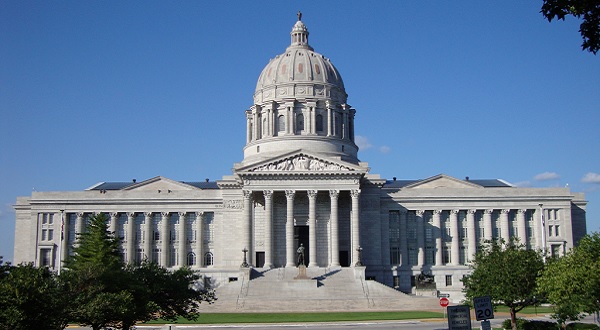
Missouri lawmakers have just hours before their end-of-session deadline to pass legislation that would make it more difficult to amend the state’s constitution – a top Republican goal.
The GOP-led Legislature faces a 6 p.m. Friday cutoff to send bills to Republican Gov. Mike Parson.
Republicans have already passed several attention-grabbing priorities, including budgeting a whopping $2.8 billion to expand Interstate 70 to three lanes across the state.
Lawmakers also voted to ban minors from receiving puberty blockers, hormones and gender-affirming surgeries. If signed by Parson, which is expected, the bill also would affect some adults. Medicaid won’t cover any gender-affirming care in the state, and surgery will no longer be available to prisoners and inmates.
Another bill passed by lawmakers would ban transgender student-athletes from joining girls and women’s teams from kindergarten through college, both at public and private schools. Schools that allow transgender girls and women to play on such teams would lose state funding.
Both proposals would take effect Aug. 28 and expire in 2027.
But the path forward to make changes to the initiative petition process is unclear; a Senate Republican has been holding up work in that chamber in what he says is a last-ditch effort to pass legislation cutting personal property taxes.
In a Senate floor speech, Republican Sen. Bill Eigel called his decision to block all legislation from passing unless the personal property tax bill is approved his “Darth Vader moment” in reference to the famous fictional Star Wars character’s decision to join the forces of evil. He said his colleagues face a similar choice.
“There are moments for all of us on God’s earth where we will face our own Darth Vader moment,” Eigel said. “We will face that moment where individually, we must decide who we are.”
Republican Majority Leader Cindy O’Laughlin called Eigel’s stall tactic “political theater” that’s part of his 2024 gubernatorial aspirations.
“We’re not all running for governor,” O’Laughlin said.
The fight means the longtime Republican goal of raising the bar to change the constitution is in jeopardy.
If approved by lawmakers, the proposal would allow voters in 2024 to decide whether to require 57% statewide voter approval to amend the state constitution. Currently, voters can amend the constitution with a simple majority.
Democrats and some Republican former lawmakers have criticized the proposal as an attempt to take power away from voters, who in recent years have flouted the Republican-led legislature by enacting policies through ballot measures.
Republicans, for example, for many years ignored public calls to legalize medical and recreational marijuana use. Voters eventually sidestepped lawmakers and enshrined marijuana in the constitution, which also makes it much more difficult for legislators to immediately undo voter-approved policies.
But GOP lawmakers have argued that legalizing marijuana through the constitution versus a state law also makes it harder to quickly respond to potential unintended consequences of ballot initiatives.
“Statute is a good place to put a lot of things, but I think our constitution is pretty sacred,” bill sponsor Rep. Mike Henderson, a Bonne Terre Republican, said during House debate this week.
Lawmakers also would face a higher bar to put proposed constitutional amendments on the ballot. Currently, a simple majority vote from both the House and Senate is needed for legislators to put constitutional amendments before voters. Under the proposed new rules, lawmakers would need a 57% vote of approval in both chambers to put amendments before voters.
The proposal would make no changes to current requirements on voters to propose constitutional amendments, including collecting signatures from 8% of voters in five of the state’s eight congressional districts.
Former Republican House Speaker Pro Tem Carl Bearden said the initiative petition process is meant to be a “check on” and independent of the legislature. He said the pending proposal “directly infringes upon the Constitutional freedoms of Missouri citizens.”
“It is not a conservative policy,” Bearden said.
Other bills headed to the governor include a ban on phone use while driving, with exceptions for hands-free calls and emergencies. The law is set to take effect in 2025. Until then, violators will only be given a warning.
Lawmakers also succeeded in extending Medicaid health care benefits for new mothers from the current two months to a full year after birth.
Missouri voters will get a chance to weigh in on whether child care facilities should be exempt from property taxes under another measure passed Friday.
The proposed constitutional amendment would authorize tax-exemption laws applying to any property used for child care outside of a person’s own home. It will appear on the November 2024 ballot, unless the governor sets an earlier special election.
There was little debate on the measure among lawmakers. But the proposal’s ballot summary says the intent is to make child care more available, which it says will support families, the workforce and society as a whole.
WebReadyTM Powered by WireReady® NSI










